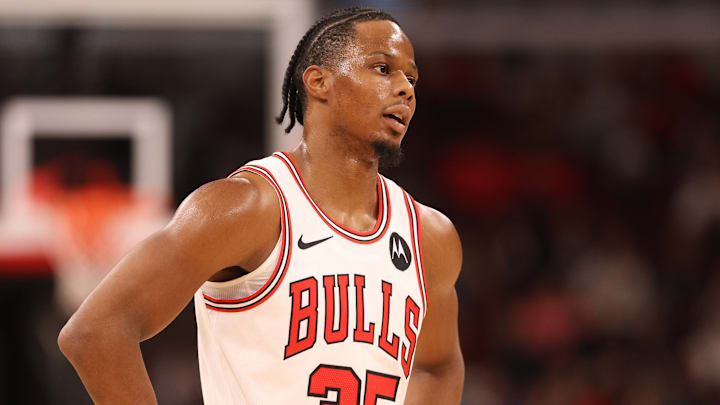This offseason, the Cleveland Cavaliers offloaded their 2020 fifth-overall pick Isaac Okoro to the Chicago Bulls in a one-for-one deal to acquire veteran point guard Lonzo Ball.
With the Cavs, Okoro built a reputation as a tough point-of-attack defender, taking on the most difficult assignments on a nightly basis. His defensive intensity earned him the support and respect across the majority of the Cavaliers fanbase. Despite his defensive excellence, however, his offensive shortcomings eventually set him on the trade block time and time again.
Joining the Bulls, Okoro got a fresh start with a rebuilding team that could offer him more opportunities to grow offensively. Shortly after being drafted to Cleveland, the Cavs' trajectory rocketed back into playoff contention. When the Cavaliers selected Okoro, the front office expected to have more than enough time for him to develop. Instead, Cleveland's sudden growth left Okoro behind, constantly changing his role and playing time.
In exchange for Okoro, the Cavaliers welcomed former second-overall pick Lonzo Ball. The 6-foot-6 guard offered a necessary skillset the Cavs had not enjoyed in a long time. Lonzo is a big guard with high basketball IQ and excellent playmaking. While he is not an offensive dynamo, he is a good three-point shooter and is one of the best backcourt defenders in the league.
Okoro is already failing in Chicago, but Lonzo is thriving with the Cavs
For the Cavaliers, the trade has already brought great results. Ball is averaging a team-high 6.3 assists in 23 minutes of action per night. Ball is also contributing 5.3 points and 4.0 rebounds. his scoring efficiency is well below what the Cavaliers likely hope to see by the end of the season, but his playmaking and defense have already looked as good as anybody could hope to see.
Conversely, the young wing Okoro is struggling to make any offensive impact at all. Okoro has been billed as a high-end defender with offensive potential. Last season with the Cavaliers, Okoro showed growth, shooting 37.1 percent from three-point range and showed potential as a reliable bench contributor. The year prior, he shot 39.1 percent from deep, suggesting consistent shooting value despite low volume.
Thus far with Chicago, Okoro has lost the offensive spark he seemingly began to find with the Cavaliers. In the first two games of the season, Okoro has missed all eight of his field goal attempts, but he has managed to collect nine fouls. In just just over 44 minutes of action, the former Cavs wing has racked up more fouls than shot attempts.
Even without scoring, Okoro has made a positive impact with the Bulls. Okoro has continued to show his defensive value, holding opponents to 41.5 percent from the field and less than 25 percent from three-point range. If Okoro manages to take a small step forward with Chicago, he may quickly become a productive wing for a rebuilding Bulls squad.
With only two games completed, the sample size of Okoro's struggles is hardly enough to declare his value to the Bulls. Chicago head coach Billy Donovan showed faith in Okoro, placing him in the starting lineup in games one and two. If Okoro's fate can turn around, Donovan's trust in Okoro may bear fruit. Otherwise, Okoro's NBA career could enter a quick downward spiral.
Isaac Okoro's Cleveland Cavaliers tenure produced mixed results, but he is still a young wing with enough potential to warrant a patient approach from Chicago. Either way, Okoro is no longer Cleveland's problem. Lonzo Ball's early impact proves the Cavaliers made the right decision this summer to cut ties with Okoro, crowning the Cavs the early winner of the trade.
